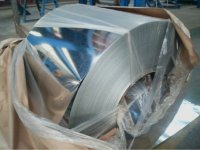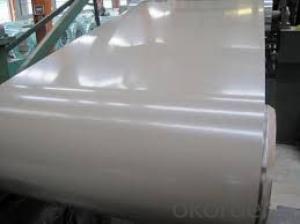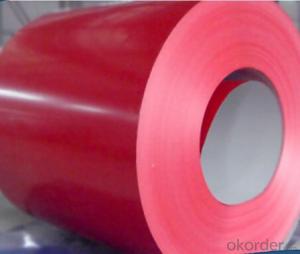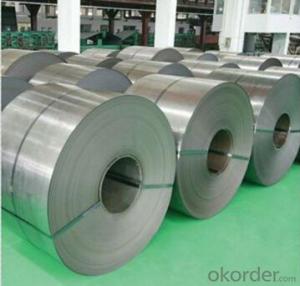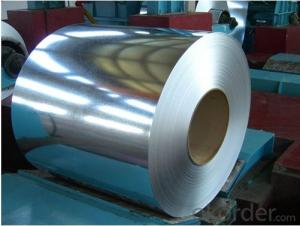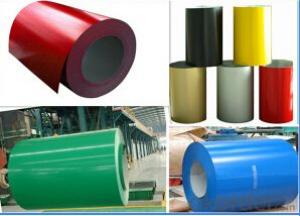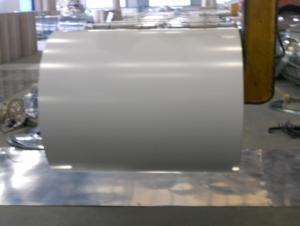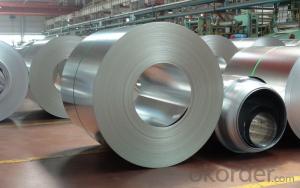Galvanized steel coil (GI,FULL HARDGI)
- Loading Port:
- TIANJIN
- Payment Terms:
- TT OR LC
- Min Order Qty:
- -
- Supply Capability:
- 30000ton m.t./month
OKorder Service Pledge
Quality Product, Order Online Tracking, Timely Delivery
OKorder Financial Service
Credit Rating, Credit Services, Credit Purchasing
You Might Also Like
We specialize in manufacturing galvanized steel coil, galvalume steel coil, prepainted steel coil and galvanized corrugated sheets.
Nowadays our company has grown up to a collectivized company . We are grateful to the cooperation partner who`s grown with us all the way. We hope we could make more friends from all over the world. Under the joint efforts of both sides we believe that we will continue to achieve win-win results based on mutual trust and mutual support.
Quick Details
| Standard: | Grade: | Thickness: | |||
| Place of Origin: | Brand Name: | Model Number: | |||
| Type: | Technique: | Surface Treatment: | |||
| Application: | Special Use: | Width: | |||
| Length: | zinc weight: | Steel gardes: | |||
| Single weight: | Payment terms: | spangle: | |||
| lead time: | moq: |

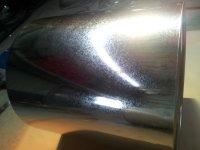
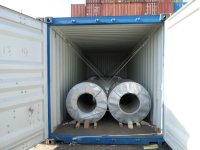
- Q: What is the difference between regular steel stainless steel? Why does steel rust but stainless wont? Is stainless some kind of alloy or something? Any knowledgeable input would be great. Thanx!
- the reagent of choice is toluene-3,4-dithiol.
- Q: How are steel coils used in the production of shipping pallets?
- Steel coils are used in the production of shipping pallets to reinforce and strengthen the structure. The coils are typically placed within the base of the pallet to provide additional support and stability, allowing the pallet to bear heavier loads and resist bending or warping during transportation.
- Q: How are steel coils used in the manufacturing of industrial boilers?
- Steel coils are used in the manufacturing of industrial boilers as they provide a strong and durable material for constructing the boiler's shell and tubes. The coils are shaped and welded together to form the boiler's structure, ensuring a sturdy and reliable construction. Additionally, the steel coils are often coated or treated to resist corrosion and withstand high temperature and pressure conditions, making them suitable for the demanding environment of industrial boiler operations.
- Q: I am currently writing a manuscript, and would like to know whether guns made out of steel, burn or melt when exposed to flames. Thanks.
- Any steel will burn in the Presence of pure oxygen and high heat, that's how a cutting torch works.
- Q: What are the different coil slitting methods used for steel coils?
- There are three main coil slitting methods used for steel coils: rotary shear slitting, loop slitting, and oscillating slitting. Rotary shear slitting involves using rotating knives to cut the steel coil into narrower strips. Loop slitting is a process where the coil is looped through a series of rolls, and the desired width is achieved by adjusting the tension in the loop. Oscillating slitting is another method where the steel coil is passed through a set of oscillating blades, resulting in precise and high-speed slitting. These methods offer various advantages and are chosen based on the specific requirements of the steel coil slitting process.
- Q: I received a very nice set of stainless steel cookware as a wedding gift. While very pretty, Im finding them almost useless for cooking. Everything sticks, they're difficult to clean, and Im using my old non-stick pans instead. Should I simply leave the stainless out for decortive purposes, or are stainless steel pans better for some applications?
- Stainless steel has some benefits: 1) Dishwasher safe: my anodized aluminum pots are NOT dishwasher safe (my wife put one in and it lost its gun-metal gray finish - sad) 2) Conductivity: most stainless steel cookware has an aluminum (or copper) middle - this transfers the heat nicely - steel by itself does not conduct heat evenly. All Clad cookware refers to the fact that the aluminum within the cookware is clad in steel. 3) Aesthetics: stainless is pretty. Stainless is not anti-stick, so you'll have to use all your skills to avoid sticking. 1) Use oil or butter: heat your pan before oiling. Once to temp, add the oil/butter and wait for it to heat-through. THEN add your food - sticking should be minimized. 2) Move your food around a lot: once you add a piece of food that is likely to stick, move it shortly afterward. This will prevent the food from gluing itself to one spot in the pan - a crust will start to appear, and that will protect the food from sticking. 3) Love the fond: anti-stick pans don't have a good chance at fond development (fond is the stuff that sticks to the bottom of the pan, and is crucial to pan sauce creation). You should experiment with your cookware, or send it to me: I am wishing for some new cookware.
- Q: Hello people.Me and the life mate have been working on a fantasy book together and we are currently in the process of outlining the cultures. The culture of our antagonists' is a sort of woodland tribal/celtic[ish] deal and they are very nature oriented. Being a detail freak and wanting to have some real world credibility in the story, I am trying to decide how they produce steel. I want steel to be an important part of the culture, but a thing that is in limited supply. I also do not want there to be a large amount of resources committeded to mining or processing iron ore for steel. So does anyone have any real world ideas explaining how the people can produce steel without using underground mining operations, large processing facilities, and without raping the land?All help and ideas are appreciated
- Well, steel is just modified iron, so you're going to have to start with acquiring the iron first. For that, you're most likely going to be using some sort of underground mining somewhere - either they do that themselves, or they purchase the iron elsewhere. Assuming you're not dealing with meteoric iron (which is possible, but pretty uncommon), or iron sands (not likely in a woodland area), then unless you're dealing with a rocky outcropping with iron veins out in the open, I'm pretty sure there needs to be somebody doing some digging. That said, it doesn't need to be a full raping of the land scenario. A couple of minor mines, some small-scale smelting operations, and somebody knowing the secret of making steel, and it could give you small amounts of steel without making an ecological disaster.
- Q: Yes, I understand it can weaken steel greatly. But can it MELT steel? (key word: melt)
- The okorder /.. A flame from a wick burning kerosene demonstrates incomplete burning, hence sooty, yellow and a lower temperature flame like a candle. Kerosene in a cup or puddle only burns while it is hot enough to give off vapor. The vapor is all that is burning. It is not very hot, as it is not the right mixture with air. It may not even give off enough heat to keep the kerosene itself hot enough to keep burning. A kero blow torch flame might be typically 1100-1300°C but parts can reach 1760°C or more in some cases.
- Q: How are steel coils processed and shaped for specific applications?
- Steel coils are processed and shaped for specific applications through a series of steps. First, the coils are uncoiled and flattened to remove any bends or curls. Then, they undergo various processes such as cutting, slitting, or shearing to achieve the desired dimensions. Next, the steel is often subjected to heat treatment, such as annealing or tempering, to enhance its strength and flexibility. Finally, the steel is shaped into specific forms using techniques like rolling, bending, or stamping, to meet the requirements of different applications ranging from automotive parts to construction materials.
- Q: Is boron steel or carbon steel a harder metal? Which one is more flexible?
- Boron is classified as a Metalloid element and is located in Groups 13, 14,15, 16 and 17 of the Periodic Table. An element classified as a Metalloid has properties of both metals and non-metals. Some are semi-conductors and can carry an electrical charge making them useful in calculators and computers.
Send your message to us
Galvanized steel coil (GI,FULL HARDGI)
- Loading Port:
- TIANJIN
- Payment Terms:
- TT OR LC
- Min Order Qty:
- -
- Supply Capability:
- 30000ton m.t./month
OKorder Service Pledge
Quality Product, Order Online Tracking, Timely Delivery
OKorder Financial Service
Credit Rating, Credit Services, Credit Purchasing
Similar products
Hot products
Hot Searches
Related keywords

